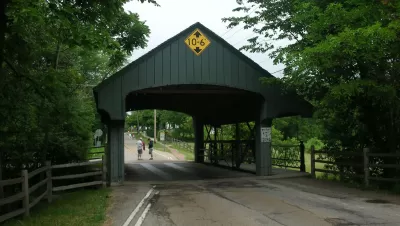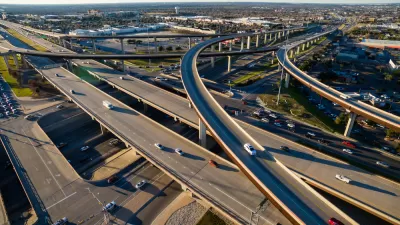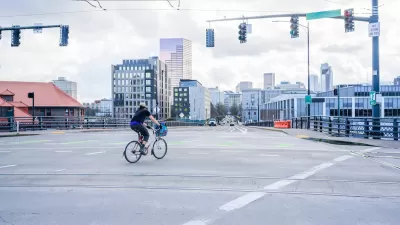Facing a shortfall of more than $1 million to maintain its roads, the Chicago suburb of Long Grove is looking to privatize nearly half of them by asking residents to pick up the tab. Residents are unhappy about the plan, but see few alternatives.

"Facing an annual funding gap of more than $1 million, Long Grove trustees have twice in recent months affirmed a plan that could privatize nearly half of the village's public roads — transferring the cost of upkeep and plowing to the residents in the process," reports Duaa Eldeib.
How did the affluent community get itself into this problem in the first place? A lack of property taxes, building permit revenues that were decimated by the recession, and "29 miles of public roads for a relatively small population of about 8,000," are seen as the primary contributing factors.
"Experts in public planning and municipal finance agree that Long Grove has hit upon an unusual potential solution to a commonplace problem," adds Eldeib. "They say other communities also struggling to make ends meet could follow suit as aging roads deteriorate and revenue streams dry up. Yet such plans could eat away at the public's trust in local leadership even as they mitigate public deficits, warned Joseph Schwieterman, a DePaul University transportation professor."
"It's going to create resentment that city hall has broken its contract to fix the roads, and that could lead to turmoil that tears at the social capital of a community," he said.
FULL STORY: Long Grove plan may pave way to privatize public roads

Planetizen Federal Action Tracker
A weekly monitor of how Trump’s orders and actions are impacting planners and planning in America.

Map: Where Senate Republicans Want to Sell Your Public Lands
For public land advocates, the Senate Republicans’ proposal to sell millions of acres of public land in the West is “the biggest fight of their careers.”

Restaurant Patios Were a Pandemic Win — Why Were They so Hard to Keep?
Social distancing requirements and changes in travel patterns prompted cities to pilot new uses for street and sidewalk space. Then it got complicated.

Platform Pilsner: Vancouver Transit Agency Releases... a Beer?
TransLink will receive a portion of every sale of the four-pack.

Toronto Weighs Cheaper Transit, Parking Hikes for Major Events
Special event rates would take effect during large festivals, sports games and concerts to ‘discourage driving, manage congestion and free up space for transit.”

Berlin to Consider Car-Free Zone Larger Than Manhattan
The area bound by the 22-mile Ringbahn would still allow 12 uses of a private automobile per year per person, and several other exemptions.
Urban Design for Planners 1: Software Tools
This six-course series explores essential urban design concepts using open source software and equips planners with the tools they need to participate fully in the urban design process.
Planning for Universal Design
Learn the tools for implementing Universal Design in planning regulations.
Heyer Gruel & Associates PA
JM Goldson LLC
Custer County Colorado
City of Camden Redevelopment Agency
City of Astoria
Transportation Research & Education Center (TREC) at Portland State University
Camden Redevelopment Agency
City of Claremont
Municipality of Princeton (NJ)





























